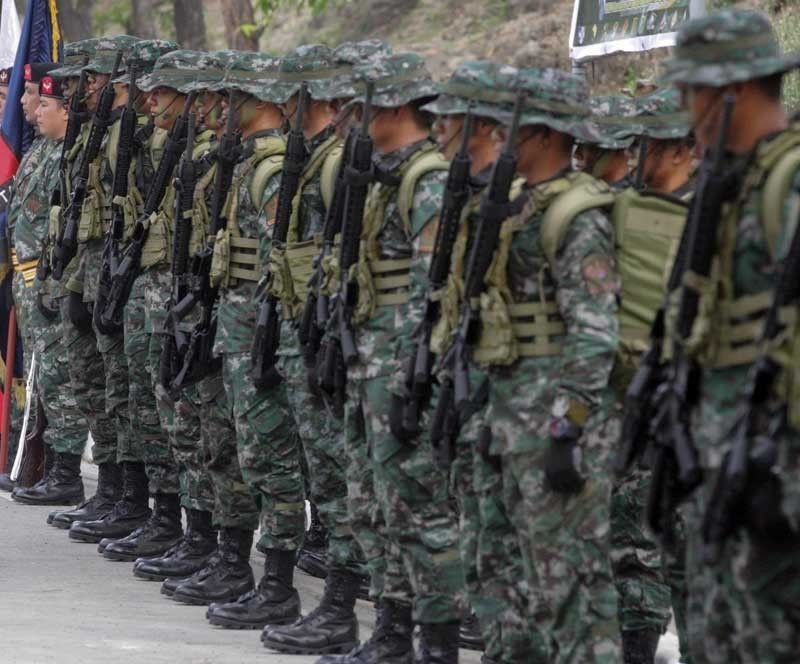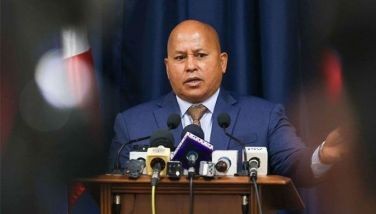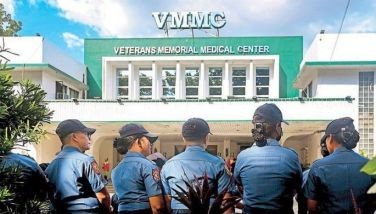DILG touts contact tracing and testing; COVID Shield wants stricter enforcement

MANILA, Philippines — The interior department and the quarantine enforcement arm of the government's coronavirus task force seem to have different ideas of what can turn the tide in the coronavirus pandemic.
The Joint Task Force COVID Shield said the "game-changer" to address the COVID-19 pandemic is stricter ordinances while the Department of the Interior and Local Government claimed that and more aggressive contact tracing would change the game.
This comes as the Inter-Agency Task Force on Emerging Infectious Diseases gears up for the reimposition of a looser general community quarantine after 13 days of modified enhanced community quarantine.
Quarantine enforcers want 'strictest enforcement' of quarantine
On Tuesday, Police Lt. Gen. Guillermo Eleazar, commander of the JTF CV Shield, called for "the strictest enforcement of quarantine rules" despite the shift to a looser general community quarantine, claiming that the infection rate in Metro Cebu was addressed with the deployment of armed police commandos who "compelled local residents to behave."
He said that mobilizing local government and barangay personnel to reinforce quarantine checkpoints and conduct regular beat patrols to enforce curfew hours would be a game-changer.
“We in the JTF COVID Shield believe that prevention through strict enforcement of quarantine rules is part of the medical solution against COVID-19," Eleazar said.
“Our personnel on the ground have been considerate for more than 150 days now since March 17. By this time, our kababayan should have already adjusted to the new norms on public health so they must follow the rules now. Violators should no longer be warned and excuses should no longer be entertained because public health is at stake. If they violate the rules, then they should be prepared for the consequences of their actions whatever the quarantine status is,” he also said.
READ: Task force sends out more cops, claims 'continuous defiance' of MECQ rules
Eleazar also encouraged barangay residents to "report quarantine violations for immediate response of the local police" as the active participation of barangays would "play a key role in terms of containing the unnecessary movement of people and blatant violations of quarantine rules that regularly happen in the streets and corners of the barangays."
He did not provide any basis for this claim.
DILG: Contact tracing, isolation, testing led to success
Just the day before, Interior Secretary Eduardo Año advocated for aggressive contact tracing, which he said would a “game-changer” to the entire country if Congress will allocate funds for the hiring and deployment of additional contact tracers under Bayanihan 2."
Although the country already has some 85,000 contact tracers, 50,000 more are needed to meet the WHO recommended ratio of one contact tracer for every 800 people, he said.
“We did a lot of things in Cebu but among all our interventions, we are making progress now because of contact tracing,” he said.
The DILG also used Cebu City as an example, though department spokesperson Jonathan Malaya attributed the success in Cebu City "to the creation of cluster clinics, barangay isolation centers, and quarantine facilities; deployment of contact tracing teams; and widespread testing."
This echoes advice imparted by the World Health Organization, which has said that governments and people across the globe should focus on testing, contact tracing, maintaining physical distance, and wearing a mask, which it said were “the basics of public health."
'We don't need a repeat of ineffective policies'
At the start of August, medical societies and healthcare collectives called for the government to recalibrate its policies in dealing with the pandemic—specifically its "unscientific [and] militarist Duterte-style lockdowns" as it hoisted the "time-out" modified enhanced community quarantine.
Although the MECQ is over and the government claims it has already re-examined its approach, the use of heavy enforcement to intimidate would-be violators has not changed.
READ: Has pandemic response been recalibrated or is MECQ a repeat of the same policies?
As of the health department's latest update, 169,213 cases of the new pathogen have been recorded since it emerged in December, while the country is still under the world's longest quarantine.
"Given the community transmission all over the country, and how we now lead ASEAN and the WHO Western Pacific Region, we don't need a repeat of policies that have not proven to be effective in mitigating the spread of the pandemic. Beyond quarantines and lockdowns, more attention must be given to the real frontlines— the communities and workplaces—not just the hospitals," Coalition for People's Right to Health co-convenor Josh San Pedro, a doctor, told Philstar.com in a story earlier this month.
- Latest
- Trending

































